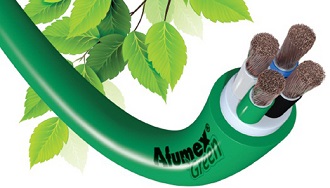 In line with the main developments in safe, reliable, and sustainable technologies, Prysmian has proven once again its pioneering spirit and innovation by expanding its Afumex Green line of cables. The new component of the Afumex family, the Afumex Green 1kV, is now the safest and most sustainable cable on the market. This release replaces the traditional petroleum-derived polyethylene used for insulation with biopolyethylene (green polyethylene), a material developed from sugarcane that is 100% renewable, has international certification, and reduces CO2 emissions. It is calculated that for every ton of green polyethylene produced, more than two tons of carbon dioxide from the atmosphere are captured and secured during sugarcane cultivation.
In line with the main developments in safe, reliable, and sustainable technologies, Prysmian has proven once again its pioneering spirit and innovation by expanding its Afumex Green line of cables. The new component of the Afumex family, the Afumex Green 1kV, is now the safest and most sustainable cable on the market. This release replaces the traditional petroleum-derived polyethylene used for insulation with biopolyethylene (green polyethylene), a material developed from sugarcane that is 100% renewable, has international certification, and reduces CO2 emissions. It is calculated that for every ton of green polyethylene produced, more than two tons of carbon dioxide from the atmosphere are captured and secured during sugarcane cultivation.
Afumex Green 1kV cables satisfy the requirements of the standards (NBR5410 and NBR13570) for electrical installations in areas with high concentrations of people and in confined environments. The Afumex Green 1kV cables have overall jackets (covers); that is, there is additional mechanical protection for every kind of installation; for example, directly buried, in open trays, in dry-wall constructions, as well as traditional conduits.
The new “green” cables of Prysmian are used to power machinery, equipment, and lighting in general, being applicable in arenas and stadiums, airports, shopping malls, libraries, museums, cinemas, theatres, subways, data centres, hospitals, schools, and commercial and residential buildings.
“Concern for sustainability is in the DNA of Prysmian. With this release, we have expanded our ‘green’ product range. We innovated three years ago when we presented the Afumex Green 750V, the world’s first ecological cable. Now, with the expansion of the line to the Afumex Green 0.6/1kV class, we continue our commitment to offer the market constant technological innovations in the wire and cable segment. The next step is to expand the use of green polyethylene to the cables used by electricity companies to distribute energy in overhead and underground networks”, says Humberto Duplat Paiva, Commercial Director of Prysmian Brazil.
The Afumex Green line does not propagate flames in the event of fire, and it has very low smoke emissions and zero toxic gases, making it the safest on the market. Additionally, it is extra-flexible, has a double layer, does not contain lead or other heavy metals, is resistant to temperatures up to 90°C, and has meter-by-meter marking.
Sales of Afumex cables currently account for about 25% of the total in the construction segment. With the launch of the Green line, combined with the increased use of “green” products and the concept of sustainability, we believe that sales growth for this line will exceed 10% per year — much higher than that of traditional products, estimated at no more than 2%”, says Paiva.
The new generation of cables, which are being produced in the factories of Sorocaba and Santo André (SP), will be marketed throughout South America. With production of the new Afumex Green 1kV line having started in May 2015, it is available for purchase through Prysmian resellers.
Green Polyethylene
Green biopolyethylene, green plastic, or green PE, are names for Linear Low Density Polyethylene (LLDPE) made from renewable sources (ethanol), i.e. not derived from petroleum, like ordinary polymers. This innovative technology was developed from sugarcane by the Brazilian company Braskem, a supplier of raw materials to Prysmian.
The biggest difference concerning this material, which is visually and functionally identical to ordinary plastic, lies in the benefit for the environment, such as the capture of more than 2 tons of CO2 from the atmosphere for each ton of polyethylene produced, in turn helping reduce the greenhouse effect.
The green resin is produced on a commercial scale in a factory in the state of Rio Grande do Sul. The raw material uses sugarcane ethanol to produce ethylene, which is then converted into polyethylene, the most commonly used type of plastic in the world.
Source
Prysmian Group, press release, 2016-02-03.
Supplier
Share
Renewable Carbon News – Daily Newsletter
Subscribe to our daily email newsletter – the world's leading newsletter on renewable materials and chemicals









